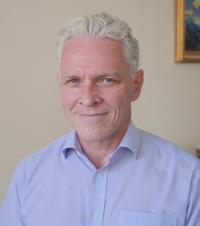ICTF Conference 2021
Cambridge and Edinburgh delegates please see your internal email for registration details.
Oxford delegates register here.
We'll be using #ICTF21 on Twitter so follow ICTF_Conference to find out what's happening.
| When: Tues 22 June | What | Who |
|---|---|---|
| 9:30 – 9:35 | Welcome and Introduction | Susi Taylor, ICTF Conference Chair |
| 09:35 – 10:20 | Plenary 1: The Secret History of Windows Task Manager | Dave Plummer |
| 10:20-10:30 | Break | |
| 10:30 – 11:10 | Workshop 1 | Various |
| 11:10 – 11:20 | Break | |
| 11:20 – 12:40 |
Plenary 2: What Next for Higher Education?
|
Dr Seán Duffy, Professor Ian Leslie, Gavin McLachlan, Professor Frank Coton |
|
|
||
| When: Wed 23 June | What | Who |
| 9:30-9:35 | Welcome and Thanks | Susi Taylor, ICTF Conference Chair |
| 9:35 – 10:25 | Plenary 3: The Challenges of Information Security in Higher Education | Professor Ciaran Martin |
| 10:25 – 10:35 | Break | |
| 10:35 – 11:15 | Workshop 2 | Various |
| 11:15 – 11:25 | Break | |
| 11:25 – 12:05 | Workshop 3 | Various |
| 12:05 – 12:10 | Break | |
| 12:10 - 12:40 | Networking Sessions | Oxford, Cambridge, Edinburgh delegates |
Dave Plummer, Programmer

Dave is a Canadian-American programmer and entrepreneur. He created the Task Manager for Windows, the Space Cadet Pinball ports to Windows NT, Zip file support for Windows, HyperCache for the Amiga and many other software products.
After landing an intensive interview with Microsoft, Plummer moved to Redmond, Washington and began working for the tech company in 1993. He began his career with Microsoft as an intern, but was later offered a full-time job with the company for $35,000 a year.
While employed at Microsoft, Plummer began creating the Task Manager program at his home. Plummer eventually showed his newly developed program to Dave Cutler, who allowed him to bring his project into work, upload it to the system, and fine tune the program into what was eventually released with the 1996 shipments of Microsoft computers. During his tenure with Microsoft, Plummer worked on software such as MS-DOS 6.2 and Windows NT, including features of note like Task Manager and Space Cadet Pinball.
Plummer left Microsoft in 2003 and continues to code in his free time. He has since started his own YouTube channel (Dave's Garage) where he creates a variety of content regarding computer programming and, his personal interest, cars.
After nearly 25 years of anonymity, on May 25, 2020, Plummer came forward on a Reddit post and admitted to developing the Task Manager application. In his post, he shares some tips and tricks for using Task Manager.
Exactly six months later, on Nov 25, 2020, Plummer came forward again with a YouTube video that described his role in selecting the ballast data for the Windows XP anti-piracy protection. Plummer claims to have used the digital images of Microsoft Bob as the initial seed into the pseudorandom number generation that produced the ballast, so that (in his words) the "Digital spirit of Bob" was included with the approximately 500,000,000 Windows XP installations.
He has been issued six patents in the software engineering space.David Plummer was the engineer responsible for designing and programming the Windows Task Manager back in 1994, and this plenary revisits the origins of the application, its design, and unique aspects of its implementation.
Dr Seán Duffy, Chief Information Officer, University of Oxford

Dr Seán Duffy has been CIO of Oxford University for over 3 years, and before that he was Director of IT Services at University of Birmingham for over 8 years. In both institutions, he has been responsible for service delivery and development for applications and infrastructure. He has also established/refreshed IT strategic directions, including fostering IT innovation. Prior to Higher Education, Sean spent over 20 years in the manufacturing sector (chemicals, explosives, flavours/fragrances) in the UK, Canada and the Netherlands.
Professor Ian Leslie, Director of University Information Services, University of Cambridge

Professor Ian Leslie is the Director and is accountable to the vice-chancellor. He is also Senior Adviser to the Vice-Chancellor with special responsibility for Information System Strategy and Environmental Sustainability, and chairs the Environmental Sustainability Strategy Committee.
Professor Leslie's research interests have been in computer networks and operating systems: he has more recently been investigating the use of information systems to reduce energy demand. He was Head of the Computer Laboratory between 1999 and 2004, and from 2004 to 2009 Pro-Vice-Chancellor for Research. He has been a Fellow of Christ’s College since 1985, where he has also served as Director of Studies in Computer Science and where he has been President since 2014.
Gavin Ian McLachlan, Vice Principal, CIO and Librarian, University of Edinburgh

Gavin was born in Toronto, Canada and attended Crescent School for his primary education.
Gavin is a Computer Science Graduate from Dalhousie University, Halifax, Nova Scotia and he also holds an MBA from Loyola Marymount University, Los Angeles, California with a major in international business.
Mr McLachlan worked at University College London (UCL) for 6 years as the Deputy Chief Information Officer and the Director of Research IT Services.
Prior to working at UCL, he held a number of senior IT management positions at Computacenter and Capita Education Services (part of the Capita Group) and in a number of other private sector organisations spanning the IT management service, educational IT service, insurance and apparel industries.
In 2015 Gavin accepted a post as the Chief Information Officer and Librarian to the University of Edinburgh. At the University of Edinburgh he is responsible for the strategic development and efficient delivery of a wide range of IT, Library and Collections services, including University’s IT Strategy, IT services, Learning & Teaching technology services, Digital Research Services, Library services, EDINA, Digital Curation Centre, Museums, Galleries and Special Collections. In addition, he plays a crucial role in ensuring that the University remains at the forefront of technological innovations that promote a world-class user experience for staff and students. He is involved or leads a number of key University programmes and initiatives including digital transformation, digital strategy, hybrid working, digital strategy, the HR and Finance systems transformation and replacement, aspects of the City Deal programme and the online and distance learning programmes world-wide.
In 2016 Mr McLachlan was appointed by the University of Oxford General Council as the external member to the University Information Technology Committee.
Mr McLachlan is also active as an advisor to Scottish government as a member of the Scottish Digital Directorate’s Digital Public Services Sponsor group; and as the chair of the Scottish Government expert group on the Digital Identity Assurance programme.
In February 2019 Mr McLachlan was appointed as a Vice Principal at the University of Edinburgh adding to his current role as the CIO and Librarian to the University.
Professor Frank Coton, Vice Principal Academic Planning and Technological Innovation, University of Glasgow

Frank Coton is Vice Principal (Academic Planning and Technological Innovation) and a member of the Senior Management Group of the University of Glasgow. He has University level responsibility for planning, budgeting and the processes and policies associated with academic career development. He also has responsibility for oversight and leadership of the development, implementation and governance of the University strategy in relation to IT and digital technologies.
Between 2010 and May 2019, Frank had responsibility for the development of educational policy and strategy and all teaching quality processes across the University of Glasgow. He also had oversight of the development of the physical and digital teaching environment. He continues to lead major change programmes around assessment and feedback and transformation of the physical and digital learning environments.
He is former Chair of the UK Russell Group Committee of Pro-Vice Chancellors for Learning and Teaching. He is also former Chair of the Student Experience Steering Group of the Universitas 21 global network of research-intensive universities and was the technical programme lead for the first Times Higher World Summit on Teaching Excellence.
Ciaran Martin, Professor of Practice in the Management of Public Organisations, Blavatnik School of Government, University of Oxford

Ciaran led a fundamental shift in the UK’s approach to cyber security in the second half of the last decade. He successfully advocated for a wholesale change of approach towards a more interventionist posture and this was adopted by the Government in the 2015 National Security Strategy, leading to the creation of the NCSC in 2016 under his leadership. Over the same timeframe, the UK has moved from joint eighth to first in the International Telecommunications Union’s Global Cybersecurity Index and the NCSC model has been studied widely and adopted in countries like Canada and Australia. The NCSC’s approach has been lauded for responding quickly to incidents and giving the British public clear and prompt advice on responding to them, putting previously classified information in the hands of industry so that companies can defend themselves more effectively, major improvements in automatic cyber security like countering brand spoofing and rapidly taking down malicious sites, and projecting the UK’s leadership in cyber security across the world. Ciaran’s work, which led to him being appointed CB in the 2020 New Year’s Honour’s list, has also been recognised and honoured in the United States and elsewhere across the world.
In his 23-year career in the UK civil service, Ciaran held senior roles within the Cabinet Office, including Constitution Director (2011-2014), which included negotiating the basis of the Scottish Referendum with the Scottish Government and spearheading the equalising of the Royal Succession laws between males and females in the line; and director of Security and Intelligence at the Cabinet Office (2008-2011). Between 2002 and 2008 he was Principal Private Secretary to the Cabinet Secretary and Head of the Civil Service and Private Secretary to the Permanent Secretary to HM Treasury.
As well as secure technology, a constant theme has been the promotion of responsible, values based-Government whether in the Treasury, Cabinet Office or the security services. As a native of Northern Ireland’s troubles which he saw in part as being themselves caused by a failure of Government, Ciaran knows the importance of fair, impartial, well run public services that work for all and are trusted. So prior to his NCSC career he is particular proud of his supporting role, along with Ministers and civil servants in London and Edinburgh, in framing the arrangements for the 2014 independence referendum an event which, whilst hotly contested, was seen by all to be fair, legally sound and decisive. His knowledge of public finances, national and international security and the central bureaucracy of Whitehall is a rare combination of experiences and expertise.
Workshop 1
Garry Scobie is the Deputy Chief Information Security Officer for The University of Edinburgh. He is a Certified Information Systems Security Professional and ITIL Expert. He regularly presents on computer security including sessions on Ransomware, Mobile Security and Cyber in the Movies. Prior to this he was responsible for Microsoft Windows server infrastructure and Active Directory. He has a particular interest in vulnerability assessment, penetration testing and promoting security awareness.
The challenges of providing a security awareness program at the University of Edinburgh are outlined and how these have evolved as a result of the pandemic. The presentation concludes with some new initiatives and plans for the future.
By Kirstie Adam and Jon Faulkner, Domain 7. Domain7 is a people-centric, design agency. They seek to collaborate with people and undertake comprehensive research activities focusing on organisational objectives, stakeholder needs and expectations and technical landscape.
In this session they'll be sharing insights and reflections with the group as well as encouraging conversation on the topic of "Leading and Developing People" through the different lenses of leadership, culture, empathy and connectedness, coaching, mentoring, trust & challenge, vulnerability & confidence, flexibility & constancy and a range of theoretical and practical reflections alongside.
By Dr Philip Hazel, former Cambridge University Computing Service Staff, Developer of exim
An overview of the history of PCRE (Perl Compatible Regular Expressions) library <https://pcre.org>, used globally by many high-profile open source (e.g. Apache, PHP, KDE, Postfix, Nmap) and commercial (e.g. Apple Safari) projects.
By Paul Seabright, Cambridge Enterprise and Lasse Thomsen, Oxford University Innovation
Cambridge Enterprise will share some of the ups and downs of their transition from on-premise to the cloud, which has been more rapid and radical than many of our institutions. As the University's knowledge transfer organisation, Cambridge Enterprise uses commercial avenues to develop the outputs of University research into successful products and services that benefit society.
OUI’s role for Oxford is the same as CE’s role for Cambridge, and there is also strong similarity in the two organisations’ IT provision. OUI’s path into the cloud has taken a slightly different route from CE: more advanced in some aspects, and less so in others. OUI will reflect on the key lessons of the journey so far and the work still to come.
Their lessons and caveats may help others consider the practicalities when implementing a 'cloud first' strategy.
By Ronald Haynes, Reltationship Manger Colleges/NSIs?GLAM & IT Community Development Manager, University of Cambridge
Linux turns 30 this year, forming part of the 50 years of development of the Unix OS family, which together (under the surface) is a major force in mobile, embedded, desktop, and online environments. This overview of the Linux desktop will introduce basics of using (and supporting) the system, some key differences to the Windows desktop, and how they can interoperate.
By Dr Kathryn Eccles, Senior Research Fellow at the Oxford Internet Institute and Pembroke College, Oxford. Her research looks at the ways in which digital tools can support access to and engagement with cultural heritage.
This talk will introduce Cabinet, a platform developed to support and extend teaching with museum objects and material culture at Oxford. From high-definition manuscripts to virtual handling of 3D objects in AR, Cabinet supports students and tutors engaging with rich material culture. The talk will present some key case studies, including an unexpected adaptation of the platform during the Covid pandemic.
By Sara Passmore, Head of Focus Development & Stephen Kavanagh, IT Manager, Social Sciences IT Support Group, University of Oxford
Creative Problem Solving (CPS) is a tool that comes from Lean methodologies, as used by the Focus Programme at Oxford. It is a structured approach to working together to understand the real underlying problem, the possible solutions, and gaining a consensus on resolution and next steps.
Sara Passmore is Head of Focus Development, and will introduce us to some of the concepts, and then Stephen Kavanagh, an Associate Focus Practitioner, will discuss how he uses the tools and methods to help him in his role of IT Manager in the Social Sciences IT Support Group, focussing in particular on incident management.
Workshop 2
Kirsty Lingstadt is Head of Digital Library and Deputy Director of Library and University Collections at the University of Edinburgh. Her focus is on the digital transformation of the library with particular focus on discovery, digital access to collections, digital scholarship, digital preservation and digitisation of collections. Previously she has worked at senior level within Historic Environment Scotland and local government.
Like other organisations, Libraries want to shift left. But how do we know where we are on the digital journey, or where we need to go? While libraries have been embracing technology for several decades, only recently have we started fully considering these questions. The Digital Library at Edinburgh realised that although it had been shifting left for a while through increased provision of online resources and other activities such as engaging with digital scholarship, it was unsure where it was in its journey. After discussions with the newly appointed Digital Transformation Team, it was decided to undertake a Digital Maturity Modelling exercise. This paper will explore how the model was developed and applied, what the results were and how the library is going to continue its shift left.
By Melissa Highton, Assistant Principal and Director of Learning, Teaching and Web Services at University of Edinburgh. Before going off to Edinburgh she was a Director of Academic IT in OUCS/OxIT and is still a fellow of Kellogg College. Her session on diversity and digital leadership is one of a series of CPD sessions she is running for digital leaders via networks such as UCISA, ALT and Advance HE.
Digital leadership is an area of leadership studies which is gaining popularity as organisations seek to ensure that their businesses are best positioned to thrive in an increasingly digital world. Digital leaders are often at the forefront of change, leading departments which are inclusive and empowering. People and culture are key to ensuring that staff are treated well and feel an ongoing loyalty to their organisation, but there are risks for digital leaders who push for change on too many fronts. This session is an opportunity to hear some of the latest research on building inclusive workplaces and consider the recommendations for understanding data about your people.
By Matthew Spaul and David Adams, Robotics and Intelligent Automation, Deloitte
An introduction with real-world examples of the many use cases for Robotic Process Automation (RPA), an evolving set of software tools to capture and interpret existing IT applications to enable transaction processing, data manipulation, and communication between multiple IT systems through a ‘virtual workforce’.
By Oliver Fuerst, Lead Developer for Restorepoint Ltd. In his day job Oliver managers a ssmall team of developers and the company's development operations. He also sometimes moonlighes as a DevOps consultant. Over the last 20 years he has built software systems small and large across all kinds of industries and technology stacks.
GitLab as an everything but the kitchen sink tool for managing the whole software development lifecycle. In this talk, Oliver will show how GitLab can be used as a DevOps automation platform that has the benefit of easy scripting, administration and on premise hosting.
By Andy Paterson, Citizen Science Lead, THIS (The Healthcare Improvement Studies) Institute, University of Cambridge https://www.thisinstitute.cam.ac.uk
THIS Institute has been 100% serverless for their backend systems since they were set up in 2018, and have never regretted that choice. Their experiences have taught them much more about the many options and opportunities on a much-evolved platform such as provided by AWS. Their technical focus now is making all services event-driven using asynchronous messaged based comms over AWS EventBridge. They will share more about what they have done with the serverless as well as EventBridge capabilities.
By Stephen Stephen Taylor, a group leader at Oxford University working on new ways to analyse and integrate biological research and clinical data.
Virtual Reality(VR), Mixed Reality (MR) and Augmented Reality(AR) are collectively called eXtended Reality(XR). These are “immersive” technologies that are set to change the way we interact with computers and with each other. XR can also be thought of as a new content delivery and knowledge exchange platform that is more engaging and interactive than we have ever seen before.
The talk will highight the benefits, challenges and increasing impact this technology is having in the biomedical field and beyond.
By Ronald Haynes, Relationsip Manager Colleges/NSIs/GLAM & IT Community Development Manager, University of Cambridge
The IIIF 3D Community Group has been cataloguing user stories and user needs, exploring various 3D workflows, and launched a viewer comparison project (VCP) with major 3D viewer developers together considering common challenges and potential solutions to key areas (e.g. interoperable annotations). Engaging widely with various specialists, a key focus is on the questions of how best to create what we might call digital dioramas - whether by visually extruding a 3D object from the existing 2D IIIF canvas (e.g. add depth to the canvas), or by embedding one or more canvases within a 3D scene (e.g. multiple paintings or texts or music associated with a cathedral, temple or palace placed again on the walls or within the interior of a suitable model). As a kind of worked example, we are developing a Cambridge collaborative proof-of-concept virtual collection for deeply related but separated collections - including specimens and objects related to Charles Darwin, combining flora and fauna, materials and manuscripts, and related items scattered across a number of specialists collections (in Cambridge and elsewhere), and complementing the major Darwin Correspondence Project (due to complete in mid-2022).
This session will share updates and examples related to the development of a IIIF 3D standard for cultural heritage institutions, including digital libraries, museums and other collections, and discuss options for further collaboration toward a common framework for the wider community.
Workshop 3
By David Ford, Head of IT and Computational Science Team Leader, School of Geography and the Environment, University of Oxford
Letsencrypt allows for the free and automatic generation of trusted SSL Certificates for websites, and other services that use SSL encryption. David will explore a number of techniques that are applicable within the University to generate these certificates easily, flexibly and automatically – including integration with the Hydra DNS API.
COGEnT - comprised of Cambridge, Oxford, Glasgow and Edinburgh Universities - is a consortium formed around a collaborative programme, initially focussed on continuing professional development (CPD), to help foster the general and expert skills associated with the 'T-Shaped' model for IT professionals. In this model (adapted from Harvard University's IT Academy) the horizontal bar at the top of the T represents the broader and cross-functional skills while the vertical bar of the T represents the deep expertise and expert knowledge in a particular area. The combined T-shaped skills and expertise enable staff to use the integrated knowledge gained from this collaboration.
Collaboration by:
Ronald Haynes, Relationship Manager Colleges/NSIs/GLAM & IT Community Development Manger, University of Cambridge
Riaz Khimji, Services Manager, University of Oxford
David Anderson, Director of Business Relationship Management and Engagement, University of Glasgow
Abdul Majothi, Head of Relationship Management, University of Edinburgh
By Anjanesh Babu, Systems Architect and Network Manager, Gardens and Museums (GLAM) IT and Haas Ezzet, Head of IT, Gardens and Museums (GLAM) University of Oxford
This workshop will present the evolution of Machine Learning Concepts at the Gardens and Museums (GLAM); from idea, to prototyping and future development.
By Darren Collins, Technical Leader for Windows Endpoint Management, Endpoint Device Management Services (EDMS), IT Services, University of Oxford
In this session, Darren will talk about EDMS's standards and best practice on Windows application packaging and deployment. He'll be introducing GInstaller, the General Installer utility written in house that standardises the packages, methods and logging for all EDMS's software packages. There'll be a quick look at the self-install menu used across CONNECT, and he'll also be introducing EDMS's newest service for ITSS - the Windows Application Library.
By Simon Richardson, UK Operations Manager, IT Schools Africa
An overview of the aims and operations of IT Schools Africa in both the UK & Africa.
How our charity partnership with Oxford University is improving life and educational opportunities.
Dr. Stuart Lee, Deputy CIO, IT Services, University of Oxford and Dr. Ylva Berglund-Prytz, Research Technology Specialist, Research Support Services, University of Oxford
Between March 2020 and March 2021 the Faculty of English and IT Services ran a crowd-sourcing project for Oxford staff and students to submit their experiences, photos, etc of life under lockdown to create an important record of the University through this time. This talk will give some background to the project (processes and systems used) but mainly concentrate on the submissions themselves and what they have told us. It will also point to some central systems/services which can be used by others to run similar activities.
By Noomi Natan, an internationally experienced coach, consultant and facilitator who has a knack for getting to the heart of issues generating positive movement fast.
Do you have to deal with difficult people at work? Maybe it’s your boss, a colleague, one of your team members or a key stakeholder on one of your projects.
No matter who it is – it’s draining.
And let’s face it – it can negatively impact your deliverables, your results, even how people perceive you.
So if you’re tired of battling with “difficult” people and you want an easier way, this session is for you.
You’ll learn:
• What it is that make people "difficult"
• What the "difficult" person needs and how to give it to them in a way that feels good to both of you
• A powerful quick exercise to do before a meeting with a "difficult" person to make sure the meeting flows better
• How to turn "difficult" relationships into smooth-working partnerships
• How to become more successful from navigating this challenging work dynamic
Networking Sessions
This is an opportunity to network with your peers and share your experiences and good practice.
This is an opportunity to network with your peers and share your experiences and good practice.
This is an opportunity to network with your peers and share your experiences and good practice.
This is an opportunity to network with your peers and share your experiences and good practice.



